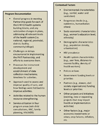A common evaluation framework for the African Health Initiative
- PMID: 23819778
- PMCID: PMC3668298
- DOI: 10.1186/1472-6963-13-S2-S10
A common evaluation framework for the African Health Initiative
Abstract
Background: The African Health Initiative includes highly diverse partnerships in five countries (Ghana, Mozambique, Rwanda, Tanzania, and Zambia), each of which is working to improve population health by strengthening health systems and to evaluate the results. One aim of the Initiative is to generate cross-site learning that can inform implementation in the five partnerships during the project period and identify lessons that may be generalizable to other countries in the region. Collaborators in the Initiative developed a common evaluation framework as a basis for this cross-site learning.
Methods: This paper describes the components of the framework; this includes the conceptual model, core metrics to be measured in all sites, and standard guidelines for reporting on the implementation of partnership activities and contextual factors that may affect implementation, or the results it produces. We also describe the systems that have been put in place for data management, data quality assessments, and cross-site analysis of results.
Results and conclusions: The conceptual model for the Initiative highlights points in the causal chain between health system strengthening activities and health impact where evidence produced by the partnerships can contribute to learning. This model represents an important advance over its predecessors by including contextual factors and implementation strength as potential determinants, and explicitly including equity as a component of both outcomes and impact. Specific measurement challenges include the prospective documentation of program implementation and contextual factors. Methodological issues addressed in the development of the framework include the aggregation of data collected using different methods and the challenge of evaluating a complex set of interventions being improved over time based on continuous monitoring and intermediate results.
Figures
References
-
- Stringer JSA, Chisembele-Taylor A, Chibwesha CJ, Chi HF, Ayles H, Manda H, Mazimba W, Schuttner L, Sindano N, Williams FB, Chintu N, Chilengi R. Protocol-driven primary care and community linkages to improve population health in rural Zambia: the Better Health Outcomes through Mentoring and Assessment (BHOMA) project. BioMed Central Health Services Research. 2013;13(Suppl 1):S7. - PMC - PubMed
-
- Ramsey K, Hingora A, Kante M, Jackson M, Exavery A, Pemba S, Manzi F, Baynes C, Helleringer S, Phillips JF. The Tanzania Connect Project: a cluster-randomized trial of the child survival impact of adding paid community health workers to an existing facility-focused health system. BioMed Central Health Services Research. 2013;13(Suppl 1):S6. - PMC - PubMed
-
- Awoonor-Williams JK, Bawah A, Nyonator F, Asuru R, Oduro A, Ofosu A, Phillips J. The Ghana Essential Health Interventions Program: a plausibility trial of the impact of health systems strengthening on maternal & child survival. BioMed Central Health Services Research. 2013;13(Suppl 1):S3. - PMC - PubMed
Publication types
MeSH terms
Grants and funding
LinkOut - more resources
Full Text Sources
Other Literature Sources
Molecular Biology Databases



